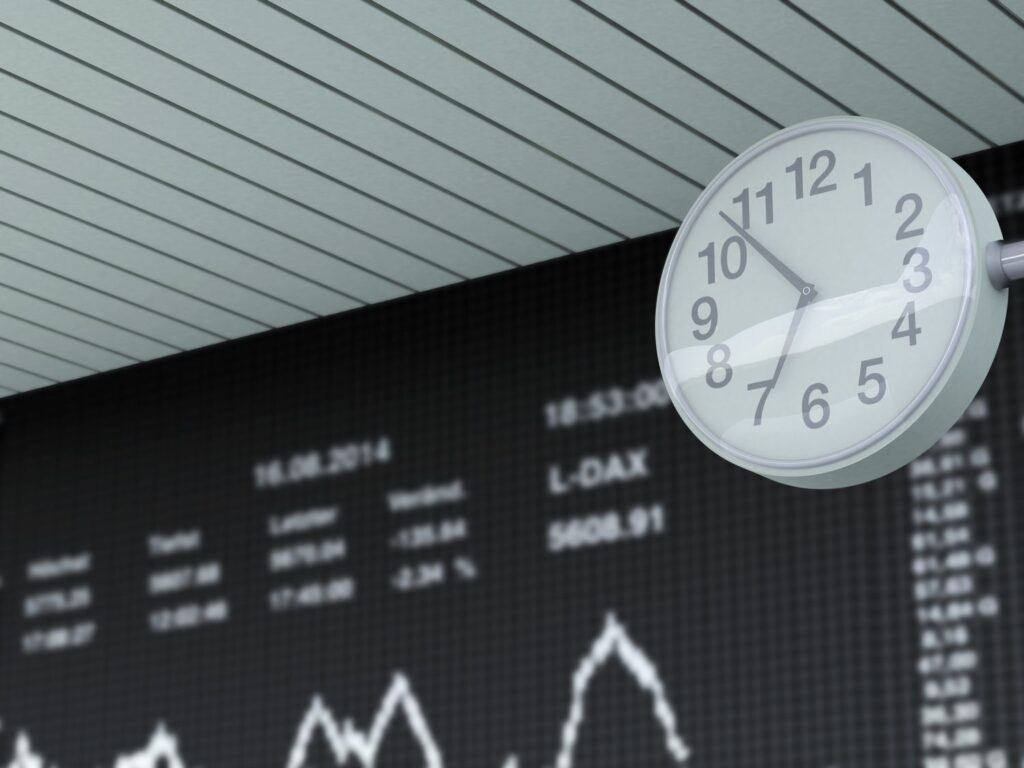A stock market exchange is a marketplace where stocks are bought and sold daily. It functions as an entity that ensures orderly trading and efficient dissemination of price quotes for the companies that list on the exchange. Trading is generally conducted from Monday through Friday, with exceptions. American investors can access international markets and exchanges online through a brokerage.
Key Takeaways
- Most of the world’s stock exchanges are open during regular business hours, in local time.
- Trades entered with an online brokerage when the exchange is closed are executed at the open unless otherwise indicated.
- North American exchanges closely match the New York timeframe.
Trading Hours on Holidays
Holidays depend on the local calendar, so they differ for every location. The New York Stock Exchange (NYSE) closes on July 4 for U.S. Independence Day. The Singapore Stock Exchange closes in early February for the Chinese New Year.
Some exchanges close for a half day from time to time. The NYSE is open only until 1 p.m. on Christmas Eve. The London Stock Exchange has a two-minute break at noon daily.
While most exchanges operate Monday through Friday, the Saudi Stock Exchange is open from Sunday to Thursday.
Trading Hours on North American Exchanges
Trading in North America is generally based on the Eastern time zone no matter where the exchange is located. The exception is the Mexican Stock Exchange (BMV), which posts its hours in Central time but adjusts its hours to match those of the NYSE.
The headquarters of the trading exchanges are in New York City, Toronto, and Mexico City. The westernmost time zone is Mexico City, with the BMV trading within business hours of Central Standard Time (CST). However, even though the BMV trades on CST, the hours mirror those of the NYSE, so, all things considered, trade is open during the same time frame.
An alternative for investors in foreign stocks is to trade American depositary receipts (ADRs), which trade on U.S. exchanges and in U.S. dollars.
Trading Hours in Asia and the Mideast
There are 11 time zones across Asia and its immediate neighbors, but fortunately, they roughtly synchronize their exchange hours to create a good deal of overlap for the sake of trade and liquidity. Some Asian markets, including the Shanghai Stock Exchange (SSE) and the Tokyo Stock Exchange (TSE/TYO), take a break for lunch. The Shanghai Stock Exchange has numerous market holidays each year, including a extended hiatus for the Chinese New Year.
On Jan. 22, 2024, India’s stock market capitalization surpassed Hong Kong’s for the first time, making India the fourth-largest equity market globally. According to data compiled by Bloomberg, the combined value of shares reached $4.33 trillion on the exchanges in India, beating the $4.29 trillion in Hong Kong.
Trading Hours in the U.K. and Europe
Europe, like Asia, has many individual exchanges. The largest stock exchange organization in Europe is Euronext, a pan-European exchange that operates in seven countries and has its headquarters in Amsterdam.
Trading Hours in South America
The largest exchange in South America is in São Paulo, Brazil. The exchange trades two hours ahead of the NYSE, so much of the action overlaps with the NYSE. Stocks, commodities, and options are traded on the São Paulo exchange.
Trading Hours in Africa
The largest stock exchange in Africa is in Johannesburg, South Africa. Egypt, Mauritius, and Nigeria have smaller exchanges.
The Johannesburg Stock Exchange (JSE) acquired the South Africa Futures Exchange and the Bond Exchange of South Africa, so all of those assets are traded on the JSE. The Johannesburg exchange is open from 9 a.m. to 5 p.m. South African Standard Time (SAST), with no lunch break. The exchange, therefore, opens 6½ hours before the NYSE.
Trading Hours in Australia/Oceania
The Sydney-based Australian Securities Exchange (ASX) is roughly the same size as the South African exchange. The ASX merged with the Sydney Futures Exchange in 2006. Bonds and derivatives also are traded on the ASX. The market opens later than most, at 10 a.m. local time, and there is no lunch break.
What’s the Difference Between a Stock Exchange and the Stock Market?
A stock exchange is a marketplace or infrastructure that facilitates equity trading. The exchange is founded and managed by a corporation, private or public. It allows companies to list their stocks in its marketplace. The term “stock market” refers more generally to stocks, or a group of stocks in a particular region, industry, or sector.
Which Major Stock Exchanges Are Closed During Lunch?
The major stock exchanges with an official lunch close are the Shanghai Stock Exchange (SSE), the Tokyo Stock Exchange (TSE/TYO), the Shenzhen Stock Exchange (SZSE), and the Stock Exchange of Hong Kong (SEHK). The London Stock Exchange (LSE) has a two-minute break at noon. Its traders don’t eat that fast. The mini-break protects institutional traders from high-frequency traders, whose split-second transactions can skew prices.
What Times Are the New York Stock Exchange (NYSE) and the Nasdaq Open?
The New York Stock Exchange (NYSE) and the Nasdaq are usually open at the same hours, from 9:30 a.m. to 4 p.m. Eastern time. Both publish annual calendars of their holidays and half days.
The Bottom Line
Most global stock exchanges are open during business hours Monday through Friday, except the Saudi stock exchange, which is open Sunday through Thursday. All exchanges publish a calendar of closures and breaks for holidays or lunch on their websites.
